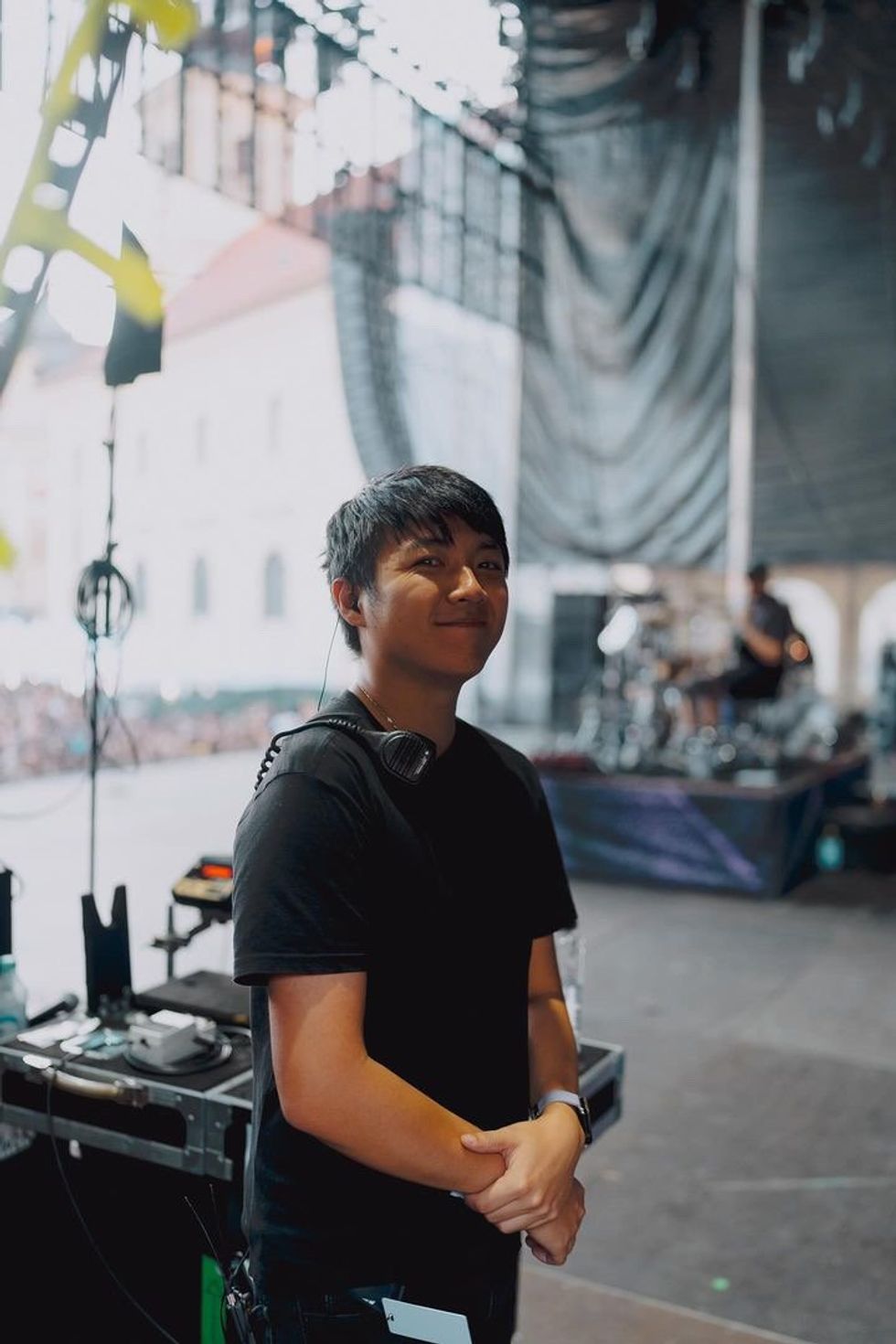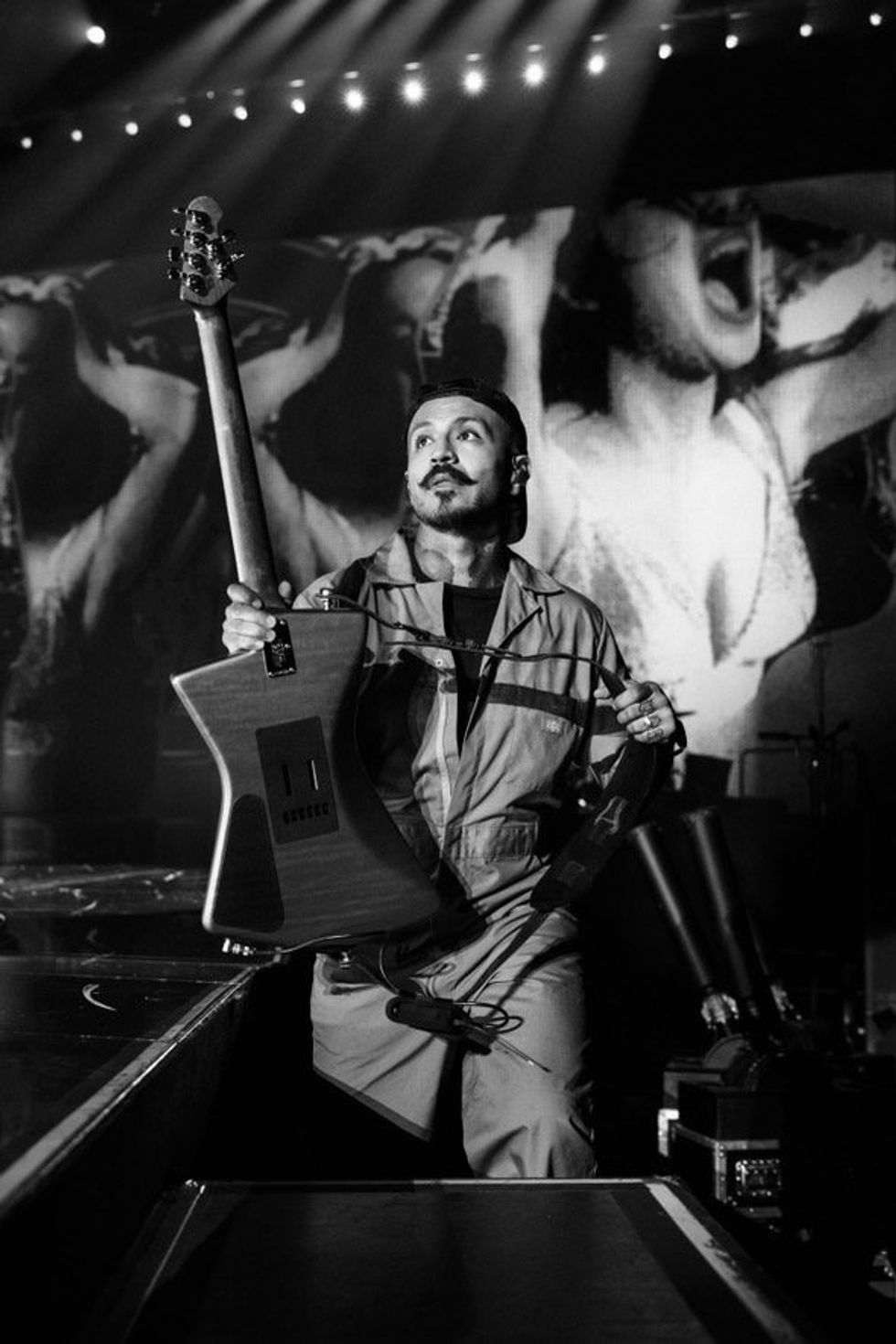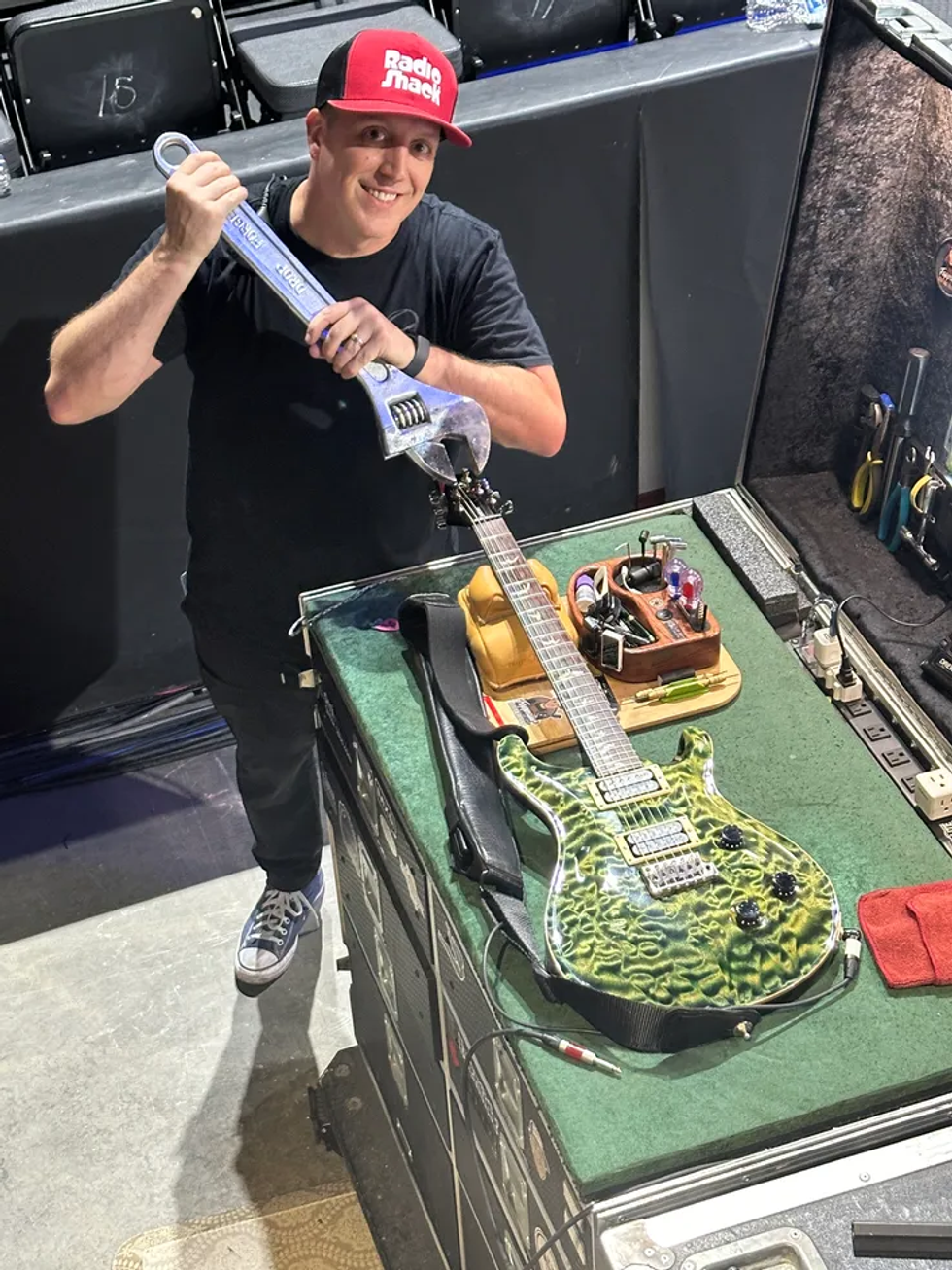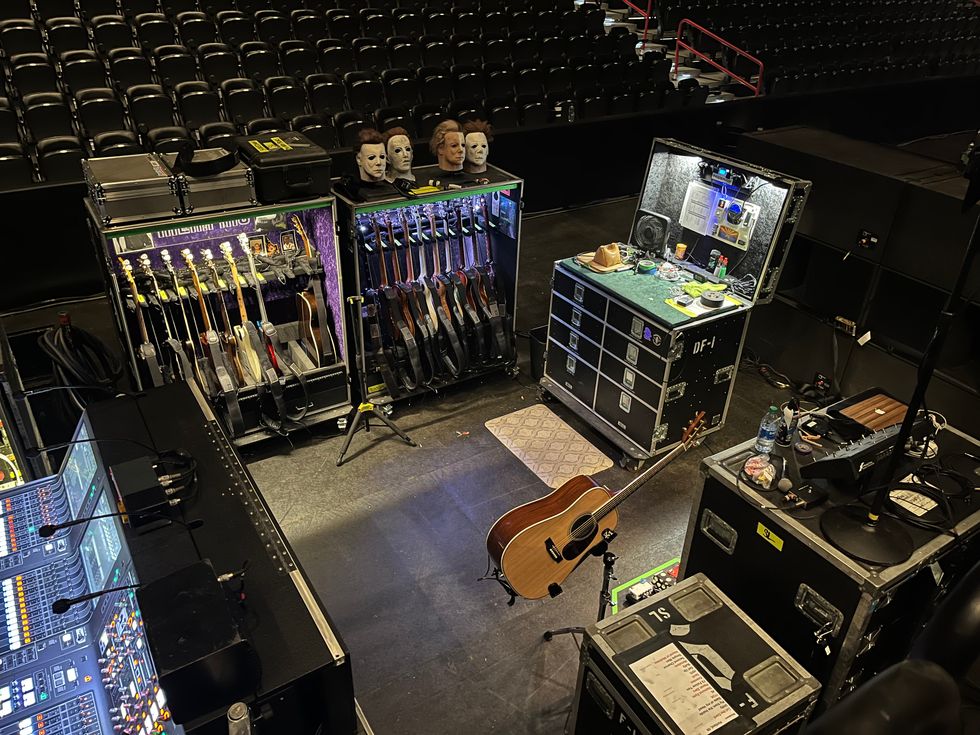AFI has always surfed their own dark wave. Although lumped in with the rest of the Warped Tour pack during the pop-punk explosion of the early aughts, the quartet from Ukiah, California (a few hours north of San Francisco) has been defined by their dramatic aesthetic and melodic, hook-laden songwriting—with both typically more refined and art-minded than those of their immediate peers. AFI's anthemic, radio-ready songs and charismatic frontman, Davey Havok, are often the focus of the group. However, the band's secret weapon has long been Jade Puget, a fleet-fingered guitarist and Havok's trusted cowriter. (The band is completed by Adam Carson on drums and Hunter Bergen on bass.)
Puget's airtight, hardcore-punk-informed rhythm playing and spirited riffing have provided much of the wind in AFI's black sails since he joined the band in the late '90s. Puget has also had a hand in co-producing AFI's albums since the breakout 2003 major-label release, Sing the Sorrow, and has helped shape and expand the group's sound by introducing electronic elements and leaning harder on the goth-rock atmospherics that have become a fundamental part of AFI's songcraft. Puget's instinct for pulling sounds from genres outside of hardcore and pop-punk (not to mention the band's striking visuals) hasn't just kept AFI's music vital and interesting. It's also telegraphed the direction subsequent generations of punk bands would take with shocking clairvoyance.
AFI - Bodies Full Album 2021 (Audio)
AFI recently returned with Bodies, a follow-up to their 2017 eponymous release (also known as The Blood Album). Bodies' 11 tracks present the band in its most mature and arguably creative form to date. While uptempo tunes like "On Your Back" and "Begging for Trouble" are reminiscent of classic AFI, they look beyond the band's distorted punk roots towards the intrigue of post-punk and '80s death-rock in a way that's fresh, without sacrificing AFI's essential personality. As a guitarist, Puget is happiest mining the creative playing found in those sub-genres, and says, "If I had it my way, I'd write only essentially '80s post-punk and '80s-style death-rock. That's really what I want to write! Guys like Daniel Ash [Bauhaus, Love and Rockets, Tones on Tail] and Wayne Hussey [the Mission, the Sisters of Mercy] are important to me. There's lots of really cool guitar stuff going on, on those records. I think because of how lo-fi a lot of it was, it wasn't taken as seriously as it should've been … but that stuff is incredible."
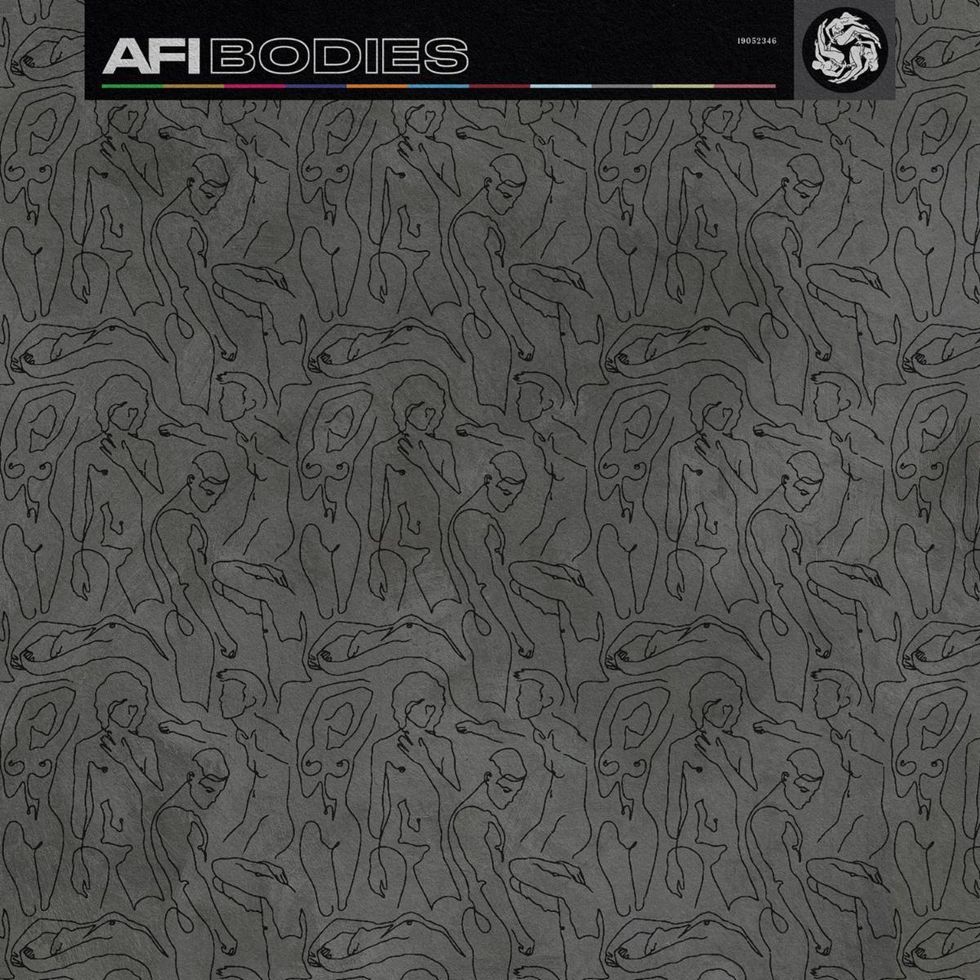
TIDBIT: AFI's latest was recorded in Jade Puget's home studio. Puget learned production watching Butch Vig and Jerry Finn at work.
No song on Bodies flexes Puget's post-punk muscles and atmospheric guitar chops as hard as the haunting, Morricone-meets-Robert Smith groove of "Dulceria," which features layers of lush guitars, a punchy, understated baritone 6-string solo, and an inescapably catchy chorus. "I have a Schecter UltraCure guitar, which is Robert Smith's signature model, and it's really cool looking, with a Bigsby tremolo," he relates. "So, I thought, 'I'm going to do a sort of Cure thing,' and that guitar really informed my playing because I wanted to put in some nice tremolo parts and clean flourishes. It's not, like, a full guitar track; it's little moments between the vocals for me to shine—which is not something I do often—and I think it formed the character of that song. The amps for it were all in-the-box, and I was using all kinds of plug-ins. Nowadays, you can create a guitar tone that no one's ever had before, which is pretty incredible! Not that the tones on 'Dulceria' were necessarily that crazy, but I like to throw different combinations of stuff together to create something unique, and that is an example."
"I've read that people get weight-relieved Les Pauls that don't sound great, but I think I just got lucky and got a super sweet one that sounds incredible!"
In addition to playing guitar and co-writing the songs on Bodies, Puget helmed the album's production and engineering. The lion's share of Bodies was tracked in his home studio. While it's certainly not uncommon for artists to track at home in the DAW/pandemic era, Puget has the distinction of having honed his production chops alongside luminaries like Butch Vig (Nirvana, Smashing Pumpkins, Sonic Youth) and the late Jerry Finn, who many credit with sending pop-punk to sonic finishing school with his productions for Blink 182 and Green Day. Finn and Vig both worked on the production of AFI's Sing the Sorrow and Decemberunderground. Puget makes no bones about his admiration of Finn's guitar production skills and the impact left on him. "As a producer, he was the best when it came to achieving great guitar tones. I'll never be able to recapture Jerry's magic and I'll never be the same perfectionist he was, but I learned things [such as] making sure when you're double-tracking rhythm guitars that you're not lazy about making sure the parts are well-matched, and doing things like having a third guitar up the middle of the stereo spread with a rattier tone that gives a bit of fullness to a big rhythm stack."

The current AFI line-up, from left to right, is Adam Carson on drums, guitarist Jade Puget, frontman Davey Havok, and Hunter Bergen on bass.
Bodies' guitar fiber is heavily layered at times ("Tied to a Tree"), but Puget approached the instrument in a decidedly thoughtful and measured way. He explains: "As I've developed as a producer and songwriter, guitar isn't really where I'm trying to show off. I'm not trying to have every song be this giant stack of guitar tracks that hits you over the head. It's become more of a special tool for me." Puget's freewheeling, less-is-more approach to tracking the guitars on Bodies marks a major shift away from the guitar consistency he sought on AFI's past efforts. "I used to get a rhythm tone I liked and that would be the rhythm tone for the entire record. Now, I want the guitar to be doing something different on every song. I'll use a drastically different sound and I do a lot of stuff in the box now, because there's so many crazy things that you can do to your guitar when you work that way. Maybe I just have songwriter's ADD, but I want to explore something new with each song, so you might be losing something with the coherence of the record, but you gain a new sonic palette with every song, which is also cool."
"I'm not trying to have every song be this giant stack of guitar tracks that hits you over the head. It's become more of a special tool for me."
Puget still fires up a big tube amp when a song calls for AFI's signature wall of palm-muted guitars, as heard on the ridiculously catchy track "Looking Tragic." "I still use tube amps and I used my Diamond Nitrox head a lot, which I also use live. And I used my Line 6 Helix a lot, which is a great tool. The world of guitar has become so vast and the purist in me is sometimes embarrassed to say that I do so much in the box, and I still do use outboard gear because you'll never be able to really recreate the sound of a cabinet in the studio pushing air. There's something that physically happens with the tonality that no amount of in-the-box tech will recreate, so there is something to be said for doing some things the old-school way. I found when it came to do something heavy sounding, it just wasn't working for me. And I still use tube amps and cabinets live, and that is something I don't think I'll ever change." For the effects used to shape Bodies' most luxurious guitar tones, Puget's plug-ins of choice were the Valhalla DSP VintageVerb, and Reflektor and Replika from Native Instruments.
Jade Puget's Gear
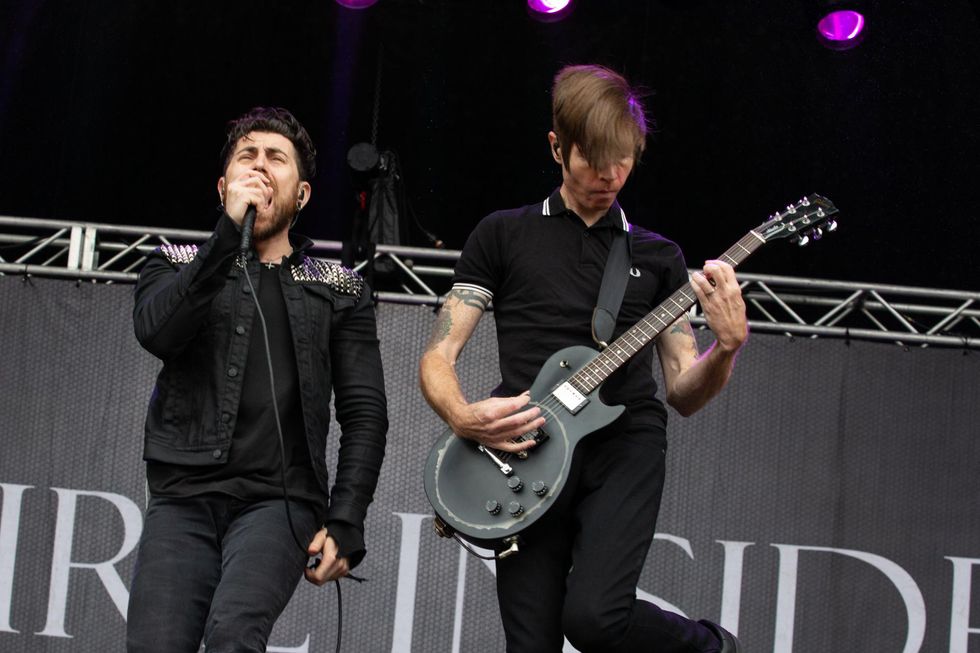
AFI's creative heartbeat is driven by the collaboration of charismatic vocalist Davey Havok and guitarist Jade Puget.
Photo by Debi Del Grande
Guitars
- Gibson Custom Shop Les Paul Cloud Nine
- Gibson Les Paul Studio
- Custom Yamaha Revstar
- Schecter UltraCure
- Fender Bass VI
Amps
- Diamond Nitrox with matching 4x12
Effects
- Line 6 Helix
- Valhalla DSP VintageVerb plug-in
- Native Instruments Reflektor and Replika plug-ins
Strings and Picks
- D'Addario (.010–.046)
- Tortex .60 mm
While the guitarist truly enjoys his trips down the sub-menu rabbit hole when it comes to crafting unique tones, for his instrument, he still reaches for his trusted Les Paul Studios, which he's used for his entire career with AFI. Their simplicity and lighter weight make them Puget's ideal axes for the road and for his high-energy performances. However, his main guitar on Bodies (and many other AFI albums) was a limited edition Gibson Cloud Nine Les Paul, which he describes as a weight-relieved Custom Shop '59 reissue. "I got that guitar when we were making [2009's] Crash Love. I called Gibson and asked if they could send down a guitar for me to use while we did pre-production, and I expected them to send some piece of shit guitar, but they sent me—I think on accident—this high-end, limited-edition guitar. It sounds so good and it's been my most beloved Les Paul since I got it. It's stock. I've read that people get weight-relieved Les Pauls that don't sound great, but I think I just got lucky and got a super sweet one that sounds incredible! Mine is on the bright side for sure, but there's something magical about it. It just has this tonality that's even across the whole spectrum, so if I'm playing a big rhythm part with major barre chords and playing every string, it just sounds so full and beautiful and clear, but it has a thickness to it that's great."
Rig Rundown - AFI's Jade Puget & Hunter Burgan
Other guitars that made important appearances on AFI's latest include a Yamaha Revstar that Puget used while triple-tracking rhythm parts, which helped him avoid the tonal redundancy that can happen when using the same guitar to track a part several times. He reached for a Fender Bass VI to layer bass parts, yet another instrument Puget was inspired to buy as a fan of Robert Smith's work on the Cure's early records.
"I love blues and I love punk, so I don't really know where I got the tapping thing from."
Puget has never been afraid to lace AFI's songs with fretboard theatrics and was particularly fond of throwing two-handed tapping into AFI's tunes at a time when that technique had not yet returned to vogue outside of the metal world. (Listen to the burning solo on the 2003 classic "Dancing Through Sunday.") But he is unsure of exactly how the athletic side of his playing developed. Puget ruminates: "I was never a guitar god guy, and I never followed the guitar virtuoso guys, because I came from the punk world. I love blues and I love punk, so I don't really know where I got the tapping thing from. I just started doing it because it was fun and it sounded cool, and I incorporated it into my sound. As far as tapping coming back around, it's funny and cool and I think it should! It's a really cool technique and I don't see why it should ever go out of style, and I think Eddie Van Halen really introducing it to the world the way he did should make sure that it's here to stay forever."

As Puget has gained more production experience, he's diversified his recorded guitar tones. "I used to get a rhythm tone I liked and that would be the rhythm tone for the entire record," he says. "Now, I want the guitar to be doing something different on every song."
Photo by Josh Massie (@scatteredpictures87)
Even though Puget possesses the chops and admits to enjoying a good shred session for fun (and has even posted clips playing accurate Stevie Ray Vaughan and Cannibal Corpse guitar covers on Instagram in recent months), when it comes to his own art, he believes too much technique can be the death of inspiration. Puget's anti-technique philosophy is something he's happy to stand behind, and one he had affirmed during the downtime of the pandemic via the wisdom of late singer/songwriter Bill Withers, of "Ain't No Sunshine" and "Lean on Me" fame. Puget says, "I was watching this documentary on Bill Withers and he said, 'Virtuosity is the enemy of creativity and artistry.' I had come to a similar realization and found that to be true: The better you become at your instrument and the more you know about music, the worse you become as a songwriter. Look at Paul McCartney or any of the songwriting masters of the last 100 years, and they don't tend to get better as they age. I've always pondered why that is and I think part of it is the more you learn your craft and the more you learn your instrument, the more it steals from your artistry. So, I try not to learn too much about the guitar. I want to continue to do new stuff on it, but I never took lessons and I can't read music and I really don't want to learn too much about it for that reason. My way of attacking that is I work harder and harder as a songwriter."
AFI's Jade Puget on Dire Straits' "Sultans of Swing" - Hooked
Beyond Puget's killer production chops and formidable, maturing guitar work, the real key to AFI's continued creative growth may lie in the rare bond the guitarist and songwriter shares with frontman Davey Havok. When asked how his writing relationship with Havok has changed since the pair first started working together, Puget is quick to point out that it hasn't. "How we do the raw songwriting really hasn't changed in 20 years! We sit down in a room face-to-face, and I have a guitar, and we'll just work on chord progressions and melodies. Even the very first time in 1998 when we sat down to write a song together, Davey and I immediately had a synergy and focus, and this singularity of purpose that we still have to this day. We never fight or argue, it's never awkward or tense. It's a great working relationship. It's bizarre because most bands that have been together as long as we have seem to hate each other. They don't want to be around each other, they have separate dressing rooms, but we don't have that."
Riff Lords: Jade Puget of AFI
Jade Puget breaks down the riffs from AFI's "Dancing Through Sunday," "The Days of the Phoenix," and "The Leaving Song Pt. II" on a Gibson Les Paul, displaying his tapping technique and precise picking along the way.
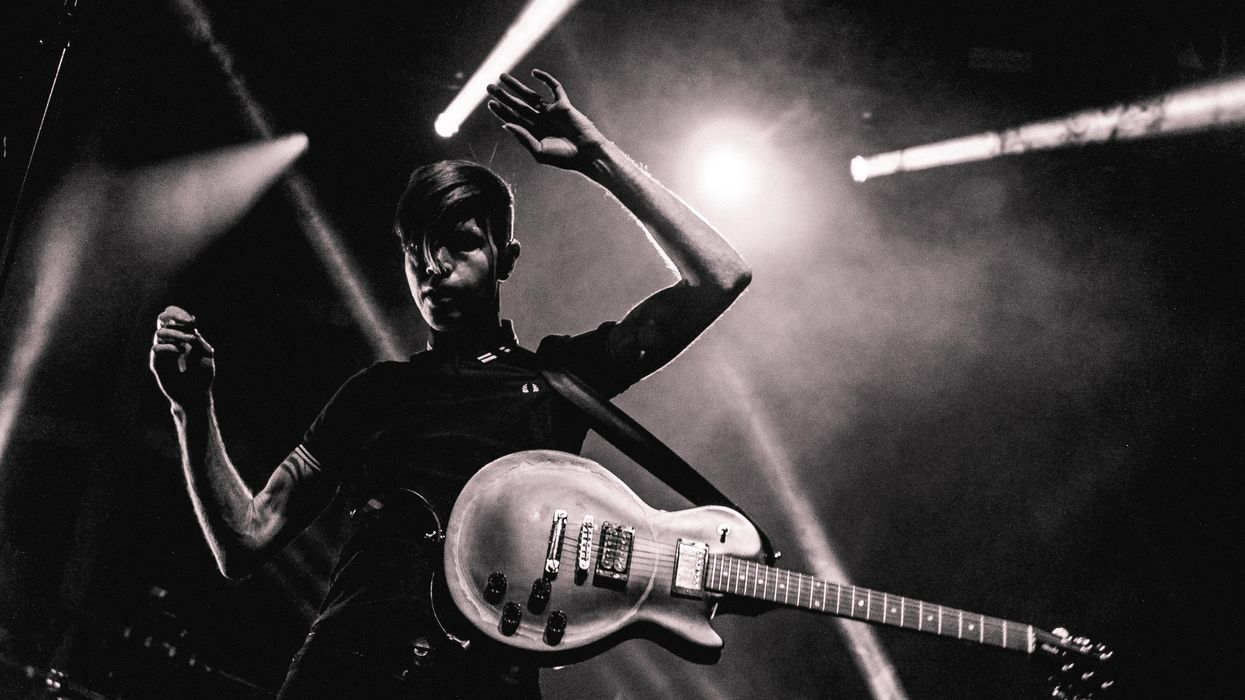




![Rig Rundown: AFI [2025]](https://www.premierguitar.com/media-library/youtube.jpg?id=62064741&width=1245&height=700&quality=70&coordinates=0%2C0%2C0%2C0)












 Shop Scott's Rig
Shop Scott's Rig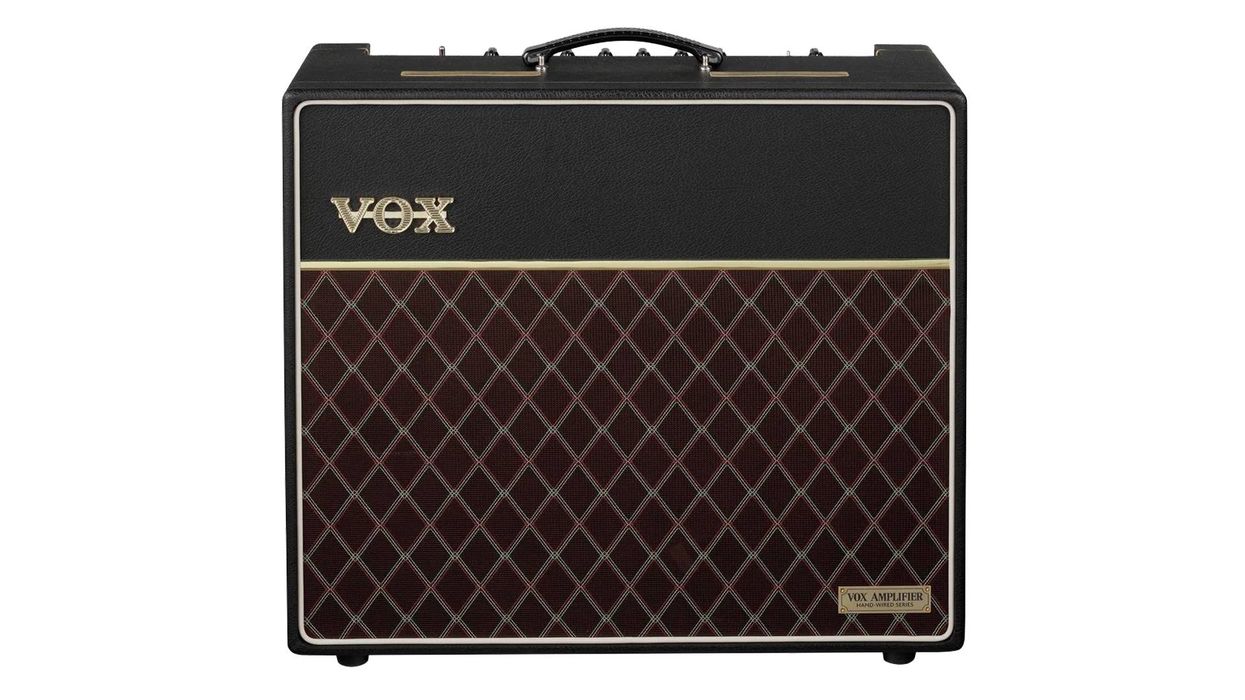
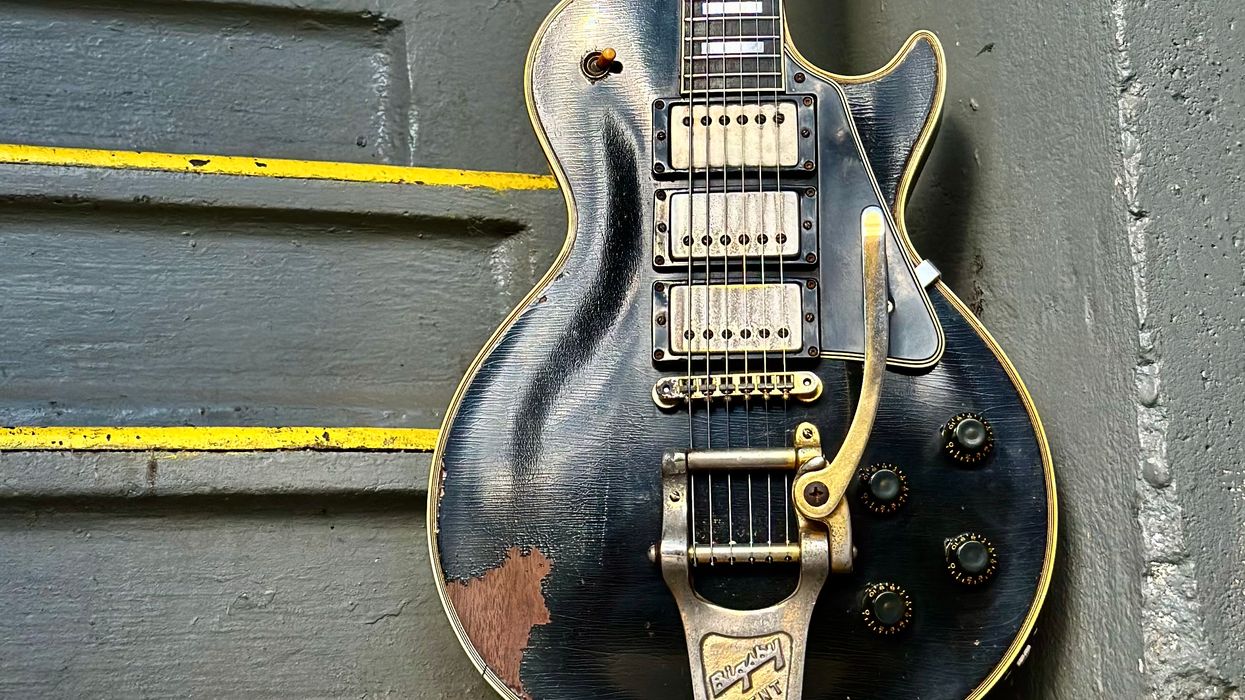
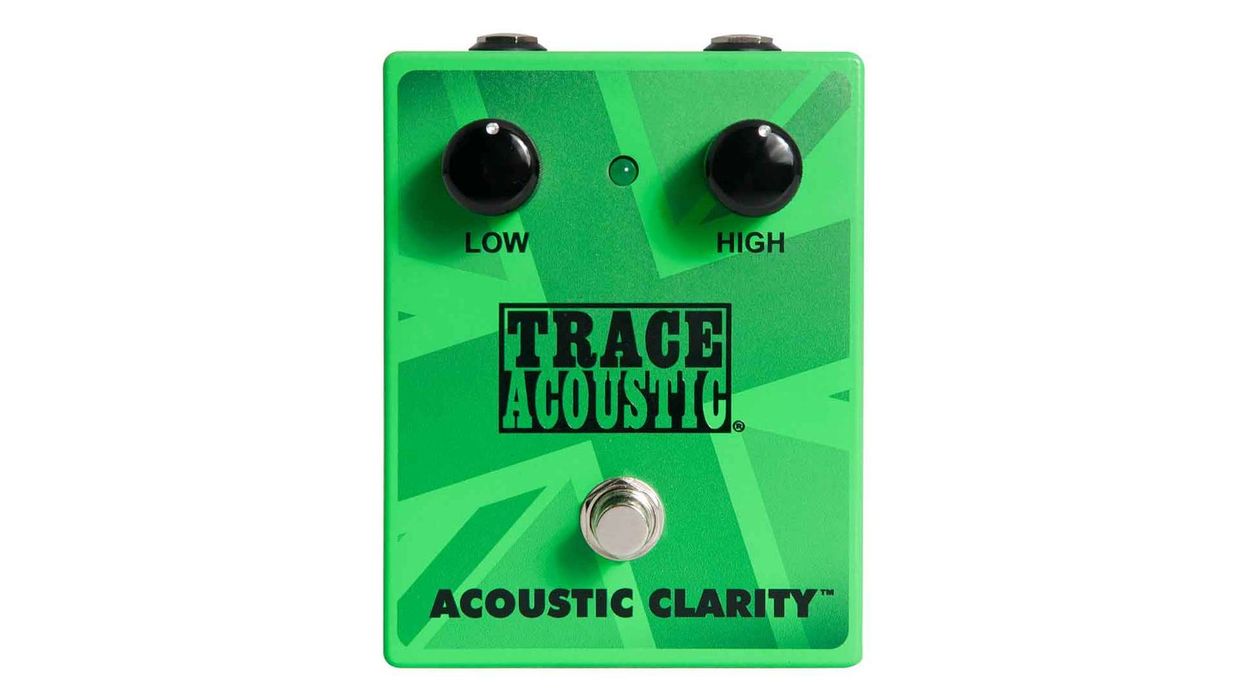











 Zach loves his Sovtek Mig 60 head, which he plays through a cab he built himself at a pipe-organ shop in Denver. Every glue joint is lined with thin leather for maximum air tightness, and it’s stocked with Celestion G12M Greenback speakers.
Zach loves his Sovtek Mig 60 head, which he plays through a cab he built himself at a pipe-organ shop in Denver. Every glue joint is lined with thin leather for maximum air tightness, and it’s stocked with Celestion G12M Greenback speakers.












![Devon Eisenbarger [Katy Perry] Rig Rundown](https://www.premierguitar.com/media-library/youtube.jpg?id=61774583&width=1245&height=700&quality=70&coordinates=0%2C0%2C0%2C0)
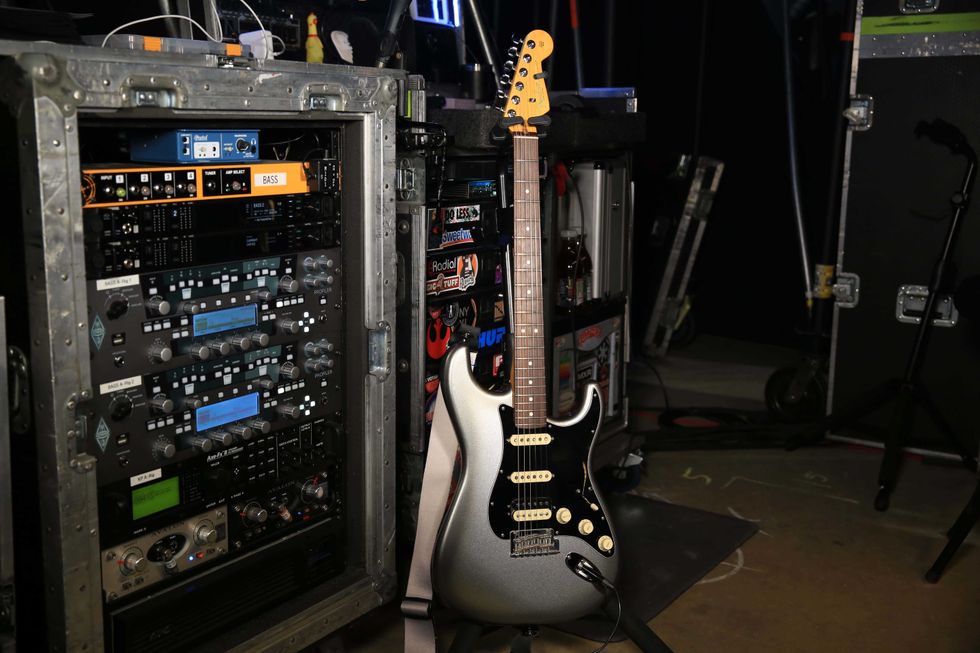
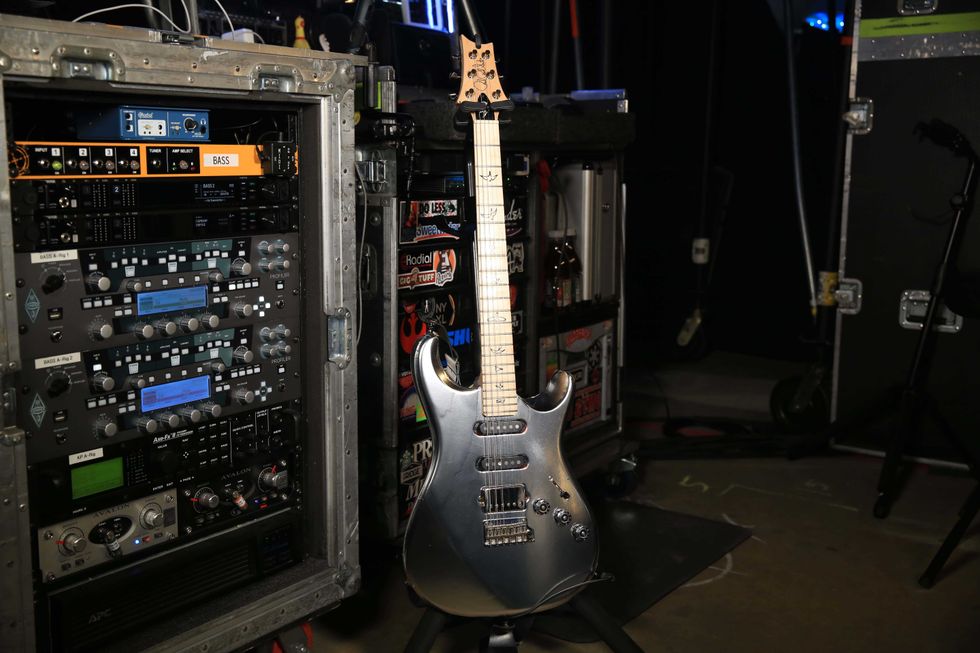
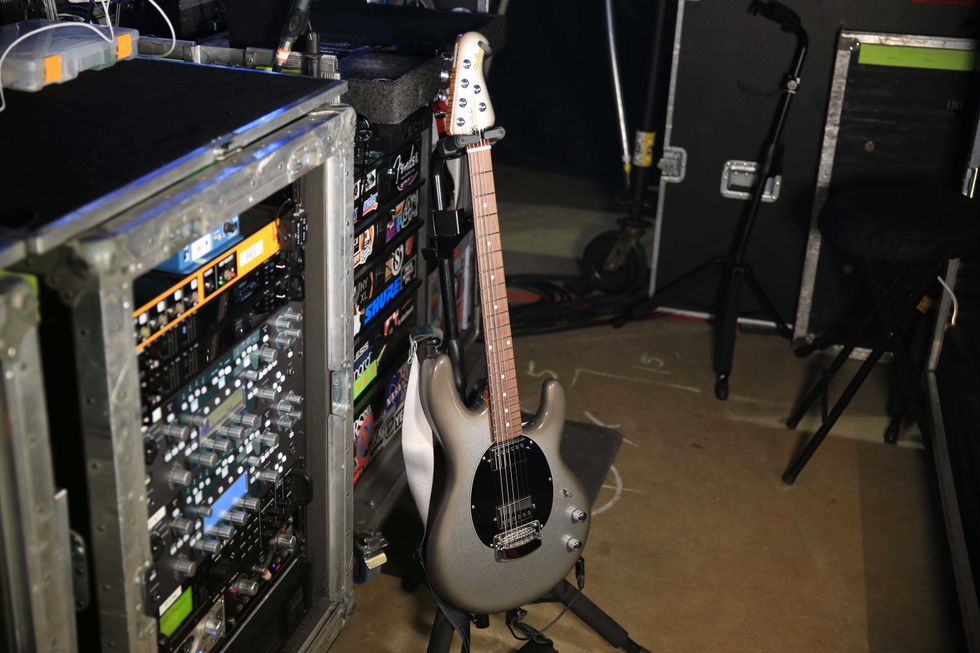
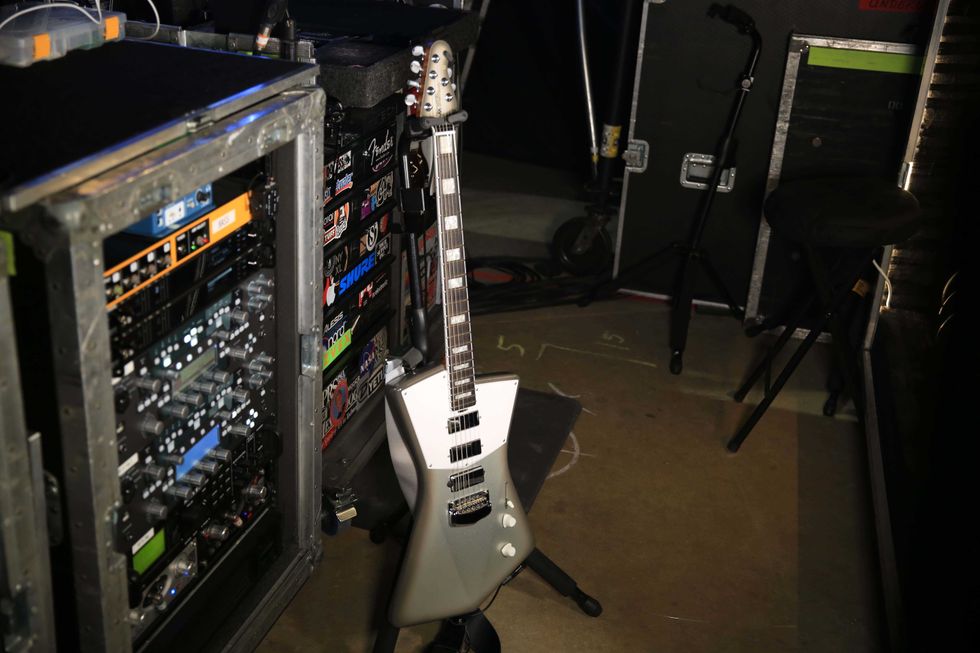
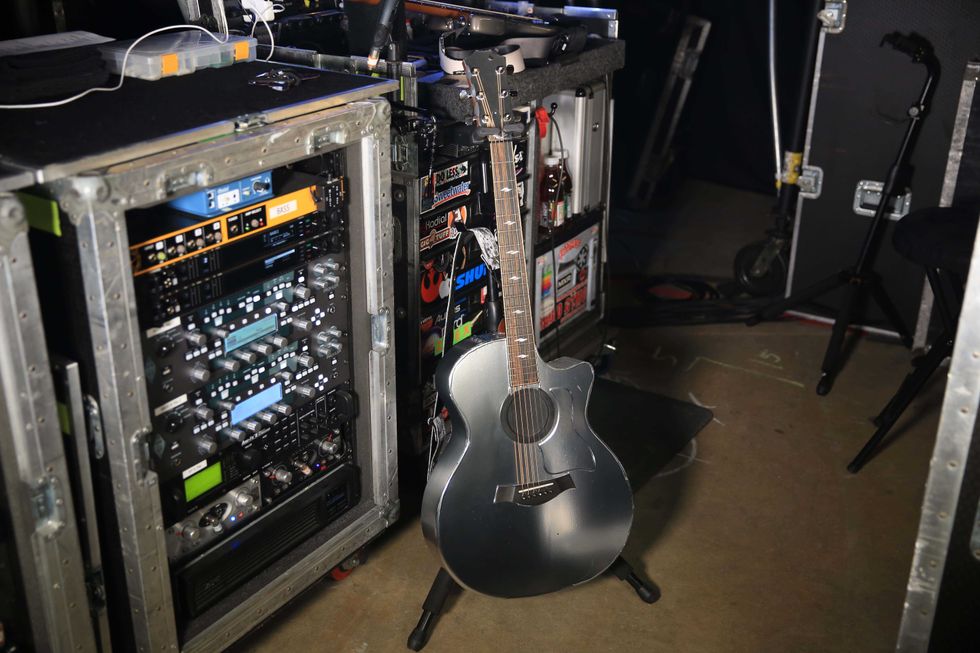
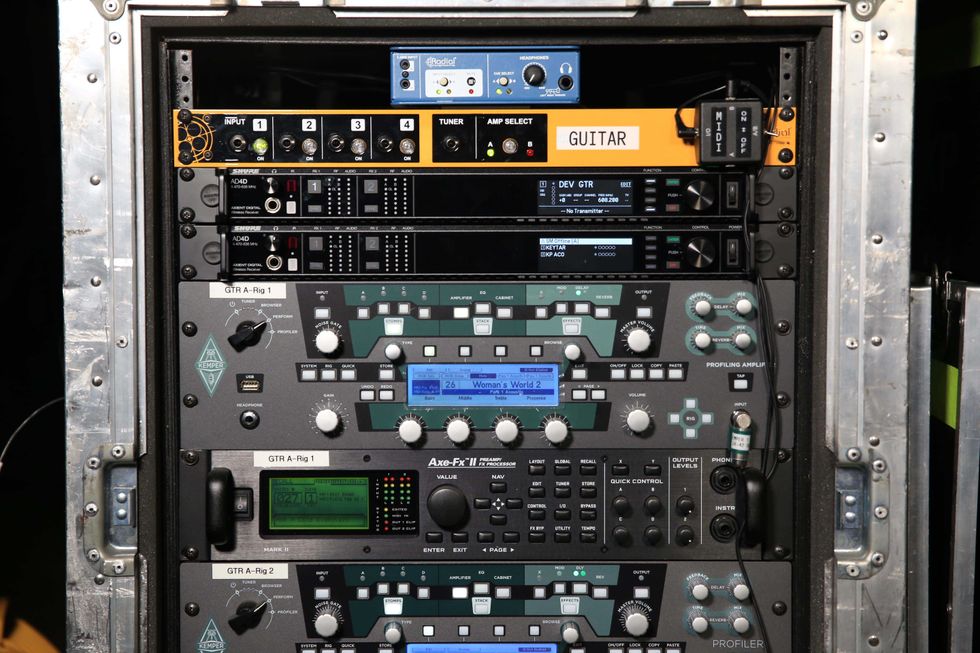


 Luis Munoz makes the catch.
Luis Munoz makes the catch.